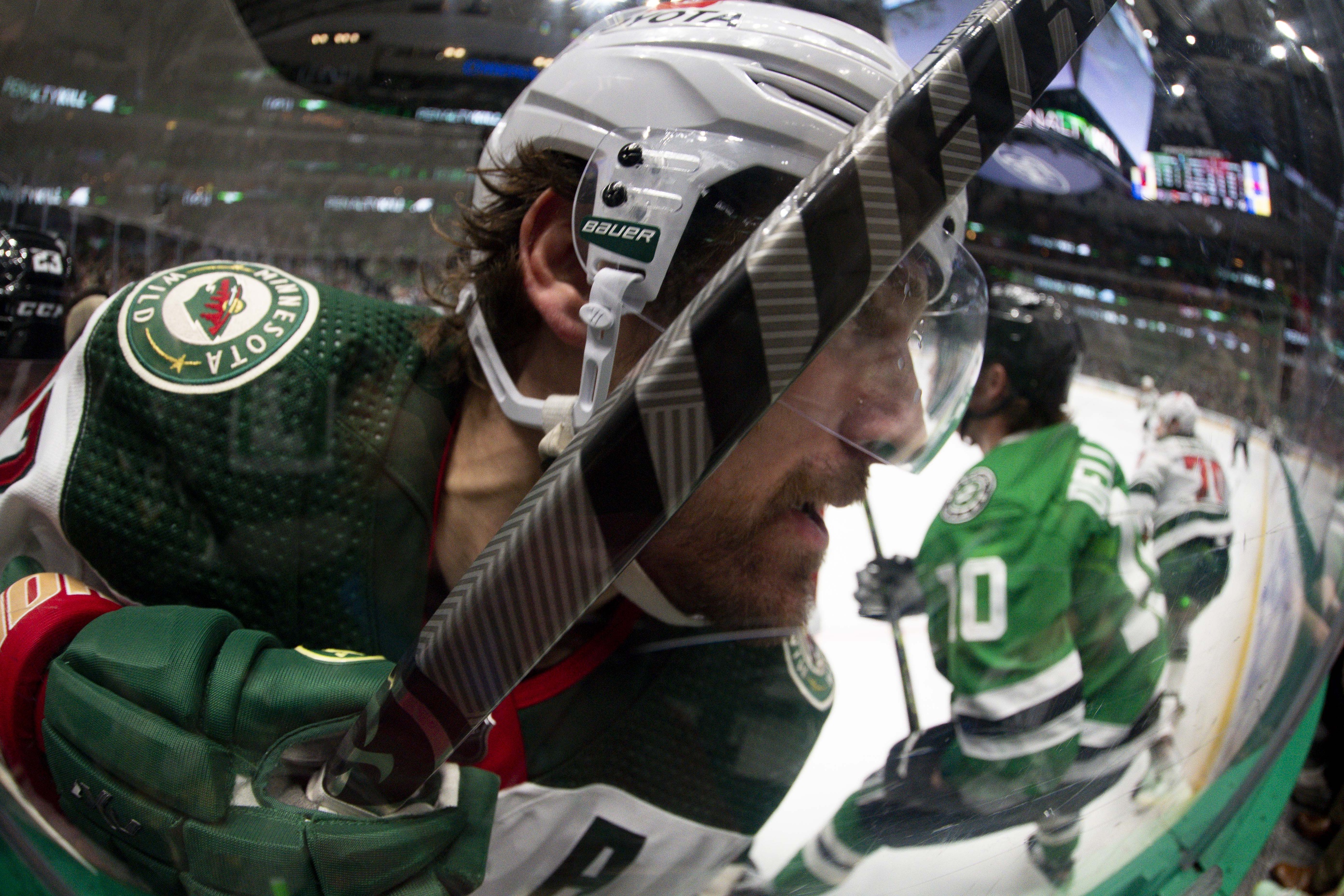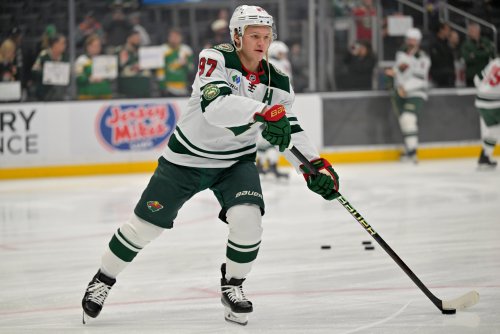
The Minnesota Wild have a new identity, and it’s working.
Earlier in the season, Dean Evason called the team’s mentality “Grit First” and laid out the basis for Minnesota’s new ethos. “This time of year, you play the right way every shift,” he said. “This league is good, and it’s going to get better. So you learn to do the right thing -- now. But it has to be consistently who we are. We are grit … first.” The team adopted Grit First as its playoff slogan, and it’s now featured all over the locker room and the team’s social media. It even inspired the pregame hype video played to the crowd before every home playoff game.
“Grit First” has the Wild playing a brand of hockey that fans haven’t seen from this franchise in at least a decade, if ever. The Chuck Fletcher era is long over. Gone with it are the Mike Yeo teams that preached shot-blocking and stick positioning. Gone is Bruce Boudreau’s blistering-fast rush offense. In its place are the early stages of the team Bill Guerin wants on the ice: Dean Evason’s Seventh-Street Savages.
The Wild built their roster to play bad-boy hockey. Its team leaders, Marcus Foligno and Matt Dumba, are two of the best pure body-checkers in the league. Foligno picks his spots on the forecheck most often, while Dumba is a master of the open-ice hit. These leaders have set a physical tone in Games 1, 3, and 4 in this series -- three games Minnesota either won or, in the case of Game 4, seemingly deserved to win.
A gang of hitters the Wild brought in explicitly for their physical talents backs these leaders up: Ryan Reaves, Brandon Duhaime, Jake Middleton, and Jon Merrill. Guerin has dished out major contract extensions to Matt Boldy, Kirill Kaprizov, and Joel Eriksson Ek, among the sturdiest skill players in the NHL. On the other hand, he traded Kevin Fiala, an excellent player who simply didn’t fit the Grit First identity. Hell, Minnesota’s top-line center is Ryan freaking Hartman.
Games 3 and 4 were a microcosm of this new identity. In Game 3, the heel-turned Wild pummeled their opponents with 45 hits to the Dallas Stars’ 22 en route to a dominant victory. Between the whistles, Minnesota openly mocked Dallas’s players for diving two nights before that game.
Central to “Grit First” is the implication that grit catalyzes exceptional hockey. In game 3, it catalyzed a solution to the Stars’ forecheck. Minnesota played the body in the defensive zone to free up a body along the wall, sparking their preferred breakout. The Stars’ aggressive forecheck left room on the weak side of their offensive blue line when the Wild attacked off the rush. When that play wasn’t there, Minnesota dumped the puck and would lay another body check on the forecheck, tiring Dallas and forcing a dump-and-change.
Minnesota paired puck movement with copious body contact to expose their opponent’s five-on-five weaknesses in Game 3. While it didn’t lead to a win, the Wild also laid the body to extreme effect in Game 4. The Stars technically out-hit Minnesota in Game 4, but the Wild dished out all the massive hits.
The result? Corey Sznajder put it best:
According to MoneyPuck.com, Minnesota led the Stars in scoring chances for much at five-on-five in Game 4. The Wild dominated in five-on-five Expected Goals (xG, an analytical measure of scoring chance quality) until the Stars took a lead in the second period. Dallas’ Game 4 victory was a critical reason that Dallas took the Game 4 victory, which I predicted last week.
Another advantage to physical defense is that it leads to fewer penalties -- especially in the playoffs. If the defender mistimes his challenge, stick-checking can lead to trips, hooks, slashes, and high sticks. The referees will call those penalties often in the playoffs.
On the other hand, separating your man from the puck only carries the risk of contact with the head, boarding, or missing entirely. By taking opportunities to give solid checks when the Stars present a target square to the defender, the Wild have been able to mitigate these risks, especially given the standard of playoff officiating.
At this point, it would be fair for the reader to point out that the officials essentially decided the game last night. Marcus Foligno delivered two heavy, clean body checks, which were both called penalties. Therefore, shouldn’t this indicate that there’s not much leeway in this series? No, because those penalties typically aren't called.
Games 5, 6, and 7 typically see fewer penalty calls. This data includes some selection bias. Teams going deeper into a series are evenly matched, and players will avoid penalties to keep from upsetting the balance. Teams deeper in a series will have a better feel for the officiating crew and perhaps adjust their game accordingly. Even so, the swing from Games 1 to 4 to Games 5 to 7 is about .8 Power Play Opportunities per game. That’s a 13% drop based on the average PPO per game in 2022-23.
The only thing an NHL referee wants less than to decide a game is to determine a series. It’s evident that Dallas’s power play was the difference in Game 4, so expect the refs to swallow their whistles for the rest of this series. As long as that holds, the team who takes the series will be the one that can get two ugly wins.
The bottom line is that Grit First is working. If officiated according to the standard of a late playoff series, Games 3 and 4 would have been landslide victories for the Wild compared to Game 2. In Game 2, they failed to box out in front of their own net, arguably the most physical place on the ice. Sustained physical play should easily carry Minnesota past Dallas.
More importantly, it feels good to be the bad guys for once. No longer must Wild fans beg, cry, and please for the refs to call the rulebook. If only they called it like the regular season, there would be room for Fiala/Mikael Granlund/Zach Parise to show what makes him so special! Minnesota has finally become a playoff hockey team this year. Therefore, Wild fans get to sit back after an uncalled penalty and smugly retort that’s the playoffs.
Fate has aligned Minnesota with something primal. Perhaps it’s tied to Dumba’s check on Joe Pavelski in Game 1 -- a result nobody wants, no matter how clean the play was -- and the subsequent reaction by the Stars. Whether this identity was formed by the Wild or against them, they're willing to set a physical tone. The whole Wild locker room has established an identity, and the opportunity in front of them calls for them to lean into it. All that’s left is to execute.
Think you could write a story like this? Hockey Wilderness wants you to develop your voice, find an audience, and we'll pay you to do it. Just fill out this form.



.thumb.jpg.9a66408f150e080283f550e72da66454.jpg)


Recommended Comments
Join the conversation
You can post now and register later. If you have an account, sign in now to post with your account.
Note: Your post will require moderator approval before it will be visible.